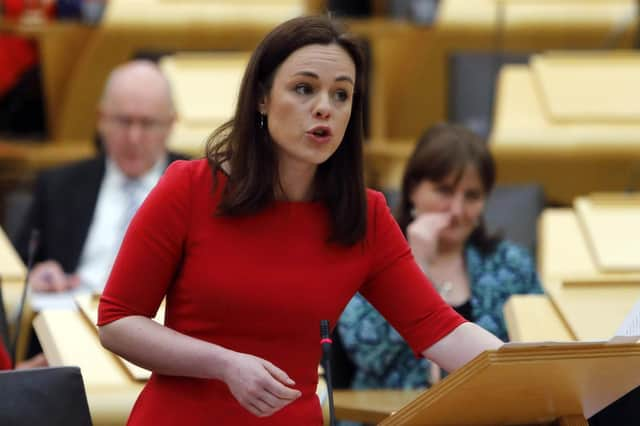Scottish Budget: ‘Katie Cautious’ missed a trick on LBTT threshold - David Alexander


It was intended to continue until at least March next year but has now been scrapped in favour of a new initiative, the First Home Fund, which will have a smaller budget and by implication provide less help to first-time buyers.
Unwelcome as it was, however, this was not the worst news relating to property finances to come out of Holyrood last week, when in her Budget, the Finance Minister, Kate Forbes, announced that the temporary increase in the threshold on Land and Buildings Transaction Tax (LBTT) would not be continued beyond 31 March.
Advertisement
Hide AdAdvertisement
Hide AdIn taking this action Ms Forbes has missed a trick on two counts. Firstly, retaining the threshold at £250,000 would have sent a clear signal that the Scottish Government wanted to continue to support homebuyers by encouraging the strong recent growth in the property market in Scotland.
Secondly, continuation would likely have continued the rise in much-needed funds as the latest Scottish Government’s’ figures reveal revenue from residential LBTT increased from £119.1m in the last quarter of 2019 to £157.3m in the last three months of 2020. In December alone LBTT revenues were £60.2m from 13,580 residential transactions which was the highest ever recorded monthly figure.
So it is extremely disappointing to find that she has effectively “cut off her nose to spite her face”.
I know the name Margaret Thatcher is, to put it mildly, unpopular in SNP circles but the Iron Lady proved that lower direct tax rates actually increase government revenue. Doing so puts more money in people’s pockets and therefore boosts consumer spending, which means additional revenue flooding into the Treasury coffers through, for example, VAT. Another benefit of a more balanced – and fairer – income tax regime was that it led to a huge reduction in tax avoidance by the better-off.
LBTT is, of course, different: if you work and earn above a particular amount, income tax is unavoidable whereas no one is actually forced to buy a house and, therefore, become liable to LBTT. In reality, however, a large majority of Scots prefer owner-occupation to renting which makes LBTT compulsory if they wish to buy a property above a certain price.
From 1 April the current threshold will be reduced to £175,000. This is a welcome improvement on the pre-pandemic figure of £145,000 but “Katie Cautious” decided it should apply only to first-time buyers. By not including all homebuyers in the revised threshold, our Finance Minister has missed an opportunity to continue a policy which was actually generating additional revenue for her own government at a time the economy was shrinking.
Talk about an “own goal”.
There is, however, a glimmer of hope in a possible announcement by the Chancellor, Rishi Sunak, of an extension to the higher stamp duty threshold (for England and Wales) in his March budget. Should this occur the Scottish Government might yet do an about-turn and following Westminster’s lead, as it did in July last year. Looking to beyond the pandemic, there is undoubtedly a case for reviewing the way LBTT operates and easing the rates at all levels as is also the case with the additional dwelling supplement (ADS) which is also to be reviewed.
Sadly, the Scottish Government continues to believe that, compared to the rest of the UK, maintaining higher property tax rates for investors, landlords, and higher-value buyers is a legitimate and attractive policy. Last week’s Budget should have shown that that Scotland was open for business and encouraged investment but, regrettably, it failed to do so.
David Alexander is managing director of DJ Alexander
Comments
Want to join the conversation? Please or to comment on this article.